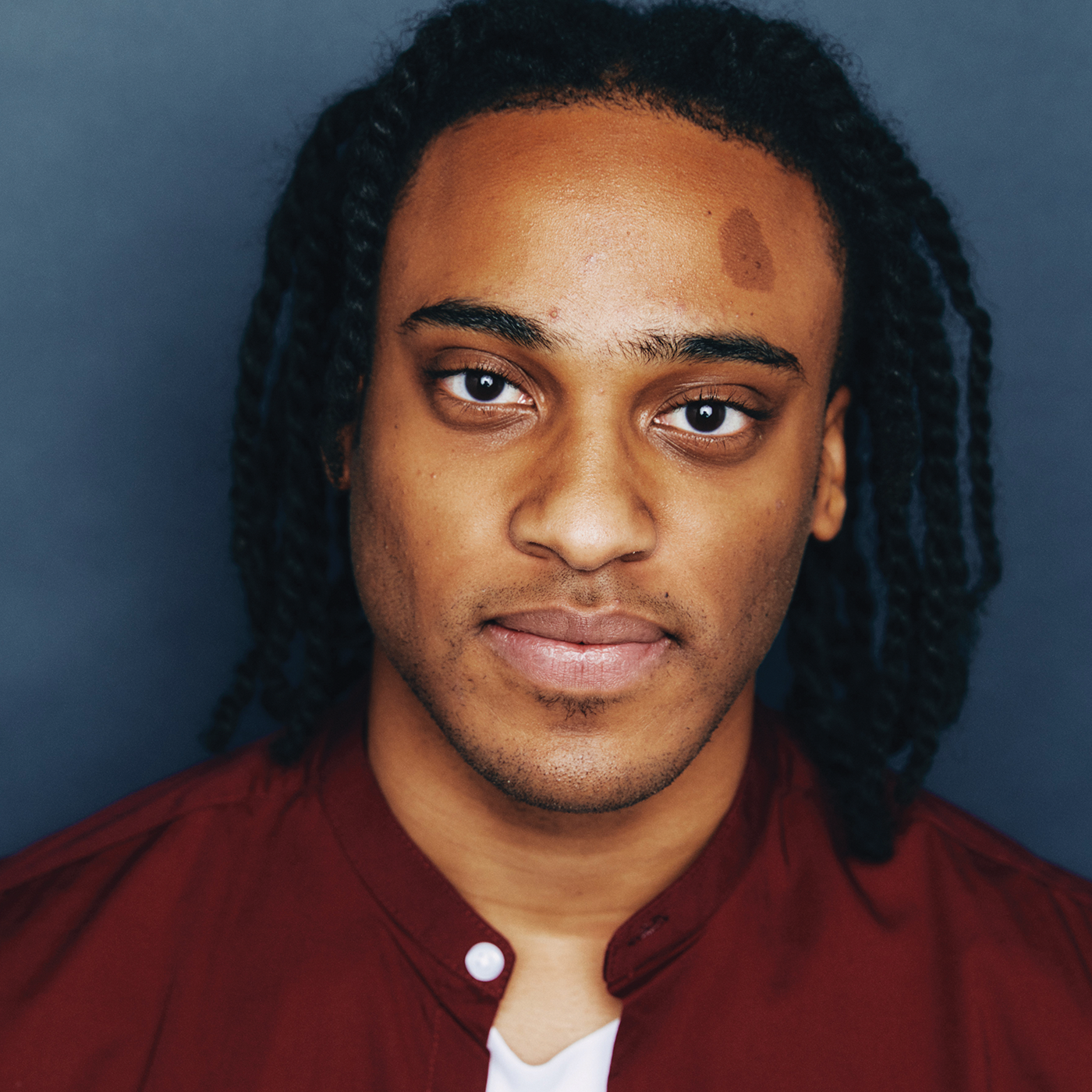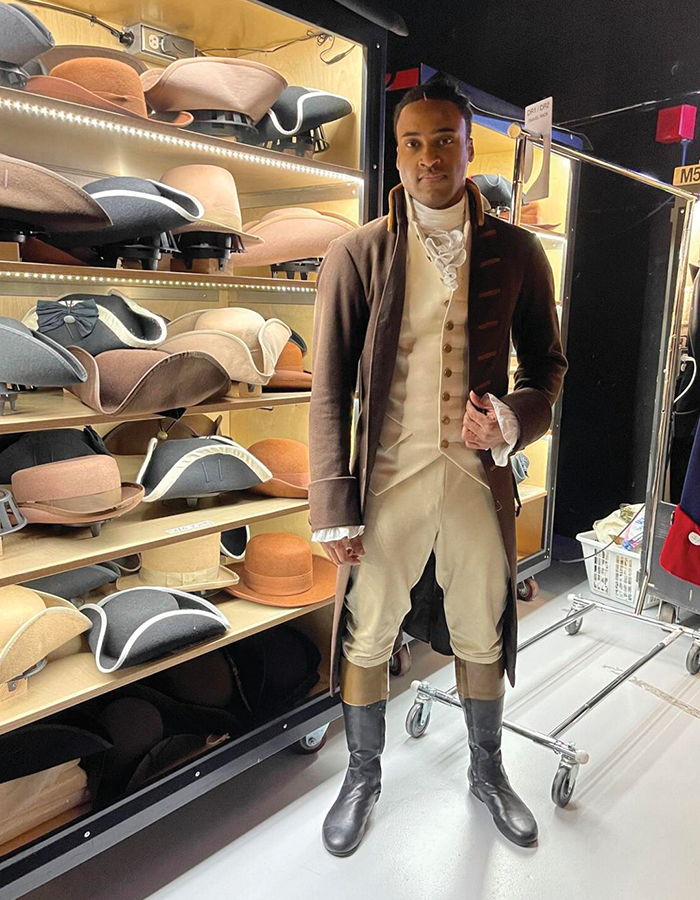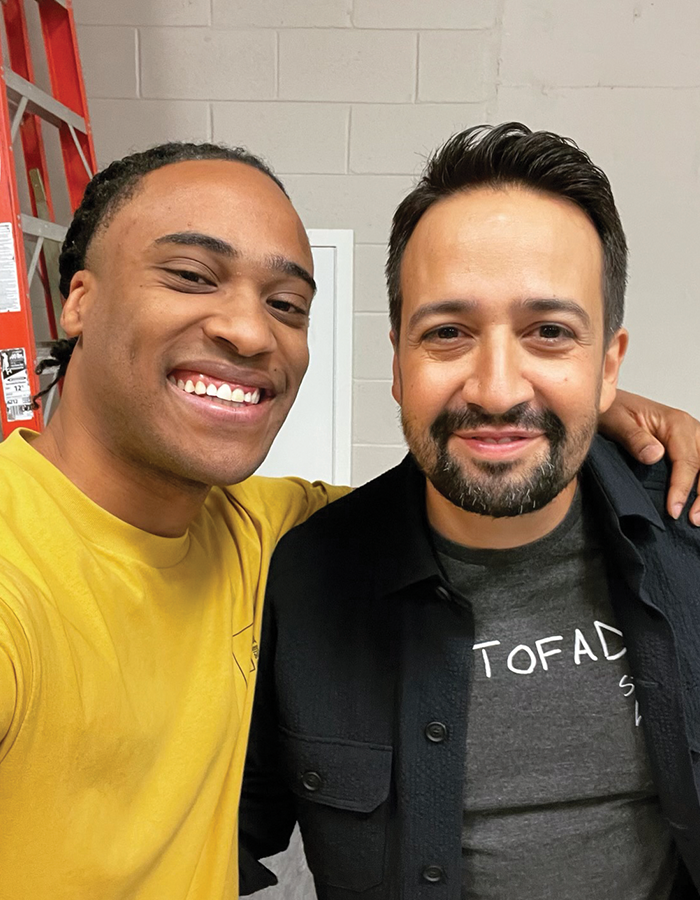
Arts & Culture
Q&A: What’s it like to star in ‘Hamilton’?
Tyler Fauntleroy (B.F.A.’17), who plays John Laurens and Philip Hamilton in the North American tour, reflects on being part of the Tony-winning musical.
After more than 20 auditions over five years, Tyler Fauntleroy (B.F.A.’17) was cast in “Hamilton” in January 2023. He plays John Laurens and Philip Hamilton eight times a week in the North American tour of the play based on Ron Chernow’s biography of Founding Father and noted duelist Alexander Hamilton.
Here, the theater performance graduate ruminates on being part of “Hamilton,” which won the 2016 Tony Award for Best Musical as well as the Grammy Award for Best Musical Theater Album and the Pulitzer Prize for drama.
Your biggest role before “Hamilton” was in “Tambo and Bones,” a frenetic hip-hop musical from 2022. Did that get you ready for a certain other frenetic hip-hop musical?
“Tambo and Bones” is probably the hardest show I’ve ever done, hands down, because of the mental stamina I needed to keep the ball in the air every night, and the beautiful thing about “Hamilton” is that it is a show that requires all of you. I’m glad that I got a taste of what it would feel like to give all of me and give when I feel like I didn’t have it to give.
How did it require “all of you”?
One of my friends in the cast, Deon’te Goodman, who plays Aaron Burr, we’ve talked about the speed of the show, and what it requires to act in the show. He’s like, “If you’re not paying attention, you’ll get from A to Z and don’t even know how you got there, but it’s your job to know how you got there.”
I think the mental stamina — the mental fortitude it takes to stay ahead of what’s going on, to stay ahead of the story so you’re not being dragged by it, in a sense. And I think also, physically, I had to change up my rhythms because of “Tambo and Bones,” and that carried over into “Hamilton.” I had to hit the gym harder. I had to go to sleep at a decent hour. I had to change up some of the stuff I was eating.

Tyler Fauntleroy backstage in costume during a production of “Hamilton.” (Courtesy of Tyler Fauntleroy)
Do you have to work out a bunch to stay physically capable?
For me, as long as I get winded at some point during the day, I’m ready for the show that night. I do a lot of body weight stuff, especially if I can’t get to a gym. If I need something, that’s going to happen in my hotel room. I’ll do a pushup workout and maybe like a leg routine, and depending on where in the week it is will determine how hard I go on my legs, because this show has so many stairs, and we’re just dancing and all that. I don’t like to do legs close to the weekend because we have two shows Saturday, two shows Sunday, so I try to be kind to my legs then.
I love high-intensity interval training. It seems to work great for me. That helps a lot, especially with getting my voice ready, breath support and warming up my voice. I’ll probably do weight training about twice a week if I’m having a week where everything is on point. I don’t do anything crazy, crazy.
It doesn’t sound like it’s only physical.
There is a unique feeling of feeling overwhelmed on stage that I’m glad that I felt in “Tambo and Bones” — to know what it feels like to just feel it and keep going. “Hamilton” is kind of similar in the sense that it keeps moving. It doesn’t stop. The times that you do get a break are so wonderful and so lovely, but when you’re on, you’re on. There’s some times when I leave the stage only to just keep moving to enter in a different spot.
There’s one scene after [the song] “Schuyler Sisters” going into “Farmer Refuted” where, when I leave after “Schuyler Sisters,” I don’t stop moving. I just immediately come back on stage. I just make a circle, basically.
When I first learned that, I was like, Wow, because “Schuyler Sisters” is the end of one of the most exhausting parts of the show for me. I just found it hilarious. I was just like, yeah, well, of course I wouldn’t stop moving because this show just requires that much of you.
Mentally, I think the one thing that has helped, that I’ve learned as far as keeping up with the speed and how present you have to be, is to let things go. You have to be in the moment. That’s the only way the speed won’t overwhelm you. Because if you’re thinking about, Oh, dang, I messed that line up or That didn’t quite come out the way I wanted it to or Am I standing in the right spot? All that stuff, it’s going to run over you, so you really have to surrender to the speed and surrender to the rush of it.
And, honestly, the machine takes care of you. It gives you what you need. The words give you what you need. The people on stage with you give you what you need. But sometimes you get so internalized and have the temptation to pick apart your performance as it’s happening. I know every actor struggles with that. It is a lesson of letting go all the time, because if you don’t, that’s when you’re in trouble.

Tyler Fauntleroy and “Hamilton” creator Lin-Manuel Miranda. (Courtesy of Tyler Fauntleroy)
In a sense, you’re taking over for Anthony Ramos, who anyone can see as John Laurens and Philip Hamilton on Disney+ and went on to star in, most recently, “Transformers: Rise of the Beasts.” Does this aforementioned machine relieve some of that pressure? Or does this machine just make it intimidating?
I’m aware that when people come to see “Hamilton,” they have their favorite John Laurens and Philip Hamilton in mind, and there might be some people that want to see how I measure up or rank with the past John Laurens that they’ve seen or know of. I know that there might be some comparison going on. I think the other part of it, too, is because “Hamilton” is the machine. The work itself, the words, the music — that’s really the star of the show. If any of those conversations are happening, they don’t reach us — or me, at least. But what I do feel every night are people that are just so happy to be there, to witness the biggest thing in musical theater in recent memory.
My friends in the cast, we talk about it and we always say, “The audience just wants to hear the words.” They just want to see you do it. It’s OK that you’re not so-and-so or another person they’ve seen. They’re just happy that they’re seeing “Hamilton” and they just want to hear the songs that they’ve been singing in their bedrooms, in their cars, all this time.
It was intimidating when I first got here, and I joined rehearsal, and I said it’s like you’re joining the Avengers. It’s what it feels like. Or you’re joining the biggest movie franchise. It’s like you’re joining the Lakers — a super team. It feels like something that is much larger than you. Because it is. And there’s a special part of being able to be a part of this history.
Within this machine, have you been able to make Laurens/Philip Hamilton your own?
The John Laurens that I bring is very much so me, and the producers want us to be ourselves here, which is nice. They’re not looking for you to re-create a past iteration. They’re not looking for you to reheat someone else’s choices. They want you to be you.
In Act I, the Sons of Liberty — Laurens, Mulligan, Lafayette and even Hamilton — that bond and that camaraderie works so well because of how our personalities bounce off each other. The rapport and the bonds and the dynamics we — the real actors — have off stage and backstage and all that stuff, that makes our performance that much richer, because I’m actually friends with these people on stage. The John Laurens that the audience gets is built upon who we are as people. I can’t help but be me when I’m on stage with people that I know and enjoy.
And then there are some artistic choices you get to make, too. In the song “Blow Us All Away,” there are some vocal choices that I make with Philip. You get to play with it. When he’s aggressive, I like to add a little bit of growl to his voice when he’s arguing with George Eacker, and when he’s outside of those scenes, he goes back to like, Oh, he’s actually still a kid, and you can show that in the voice and pulling that dial up and down. I think — macro sense — because I am who I am, and the people around me are who they are, and the rapport that I have with them, that brings out a certain color and performance that is only what it is because I’m here with them.
